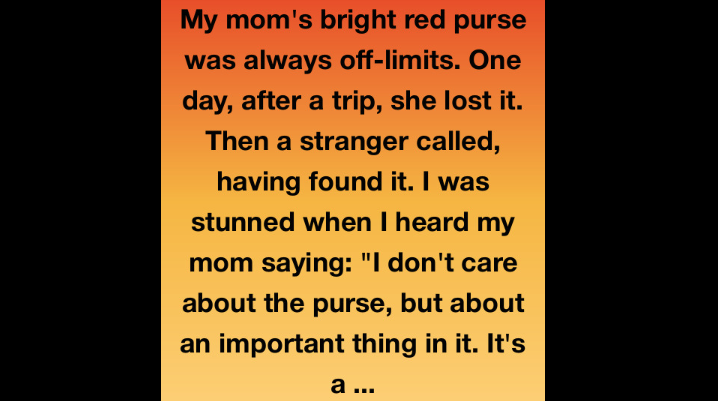My mom’s vibrant red purse was always untouchable. One afternoon, after a journey, she discovered it was missing. Then a stranger phoned, saying they’d recovered it. I was astonished when I overheard my mom declare, “The purse doesn’t matter to me, but there’s something vital inside. It’s a letter.”
That caught my attention. A letter? Among all the contents of that hefty, noisy-zippered purse, that was her priority? Not her wallet, not her phone, nor the collection of coupons she treasured like rare coins—a letter?
It was the summer I turned 22, back home after graduating university. I was caught in that strange space between “student” and “grown-up.” Job applications were stalling, and I was consuming far too much cereal at odd times. My mom had recently returned from a brief visit to the countryside to see her longtime friend, Mariana.
When she noticed the purse was gone, her face drained of color. I’d never witnessed her so shaken—she paced as if the room was shrinking around her.
“What’s so special about a letter?” I asked, leaning against the doorway.
She glanced at me, then looked away, biting her lip. “It’s… intricate,” she replied. “I’ve kept it for over 25 years.”
I didn’t press further. But the thought lingered.
Hours later, the phone rang. A man’s voice, steady and mature, said he’d found a red purse at a gas station on Route 6. It had a tag with our home number inside.
My mom nearly stumbled in her rush to the phone. “Thank you—yes, that’s mine,” she said, breathless. “Please, the purse isn’t important, but there’s something inside. A letter. It’s in a blue envelope with a sunflower on it.”
A brief silence followed.
Then the man said, “I see it. Would you like me to send it?”
Mom exhaled softly, a sound so delicate it felt profound. “Please. Only the letter. The rest can stay.”
He laughed gently. “I’m not keeping your purse, ma’am. I’ll send it all. But the letter—I’ll mail that tomorrow, express delivery.”
Mom thanked him with a warmth that carried an unexpected weight. After hanging up, she sank onto the couch, her eyes glistening but tearless.
She murmured, “That letter holds the last piece of something I’ve only now begun to understand.”
I wanted to ask more. But instead, I sat beside her. That was new for me—I was always eager to unravel mysteries or solve problems. But this moment felt like it needed patience.
The letter arrived two days later.
I found her at the kitchen table, holding the envelope. She didn’t open it immediately, just gazed at the sunflower sticker as if it might vanish.
Finally, I asked, “Can I know what it’s about?”
She nodded slowly. “You’re ready now. I should’ve shared this years ago.”
Then she told me the story.
When she was 22—my age—she had finished nursing school. Full of hope and a touch of innocence, she took a spontaneous weekend trip to the seaside with friends. On their final day, they stopped at a cozy beach café, where she met a man named Victor.
Victor stood out. Warm eyes. A smile that felt like it had been saved for her. They talked for hours over lemon sodas and salty fries. He was a musician, heading to France for conservatory, traveling before his new chapter began.
She never believed in fate, but something about him stirred her deeply.
They shared two days together. Only two.
No grand promises, no talk of eternity. But when he left, he gave her a letter. He told her to read it only if she ever questioned her worth, ever forgot her true self.
She never opened it.
She never peeked inside.
She carried it through nursing shifts, heartaches, her marriage, and even when she was pregnant with me. That letter stayed in the bold red purse she bought for her 30th birthday—the one that made her feel fearless.
I blinked. “You never read it? In all these years?”
She smiled faintly. “No. I thought I didn’t need to. But lately, I’ve been reflecting on who I was before life took over.”
That night, I found her asleep at the table, the unopened letter beside her.
By morning, it was gone.
She didn’t mention it again. For a week, life resumed its rhythm. I sent more job applications. She returned to her hospital shifts.
Then, something changed.
She began humming more often. She reorganized the porch plants. She baked banana bread and shared it with neighbors—something she hadn’t done in ages.
One morning, she looked at me and said, “I’m thinking of applying for that medical mission in Peru. You know, the one I mentioned a decade ago?”
I nearly spilled my coffee. “You said you were too old for that.”
She shrugged. “Maybe I’m not.”
The letter, I realized, had shifted something within her.
Days later, a woman named Lidia called. She introduced herself as Victor’s niece.
“I’m sorry to intrude,” she said. “My uncle passed away recently. While sorting through his journals, we found a note with your mother’s name and number. He never married. Always spoke of a woman he met on a beach—said she saw his soul.”
I was speechless.
Lidia went on, “He wrote many songs. One was called Sunflower Letter. I thought you might want to hear it.”
She sent it that afternoon. A gentle guitar melody with a voice like a warm breeze.
When I played it for Mom, she smiled—no tears, just a serene calm.
She whispered, “He remembered.”
That was what mattered most. Not the romance or the possibilities left unexplored. Just that someone, somewhere, held her in that light.
Weeks later, Mom applied for the Peru program. And was accepted.
Meanwhile, I landed a job as a junior copywriter at a small agency. It wasn’t flashy, but it felt like a true beginning.
One evening, I asked if I could read Victor’s letter.
She nodded and handed me the faded envelope.
I unfolded it carefully. The paper was soft, worn by time.
It wasn’t a love letter.
Not quite.
It was a snapshot of kindness. Victor wrote about how he saw her—her laughter, her curiosity, the way she truly listened. He urged her to never forget her worth, that she carried a light the world might try to dim. But not to let it.
He closed with: “If you ever need a reminder of who you were before the world shaped you otherwise—let this be it.”
I read it three times. It felt like he was speaking to us both.
I asked why she opened it now, after so long.
She said, “I was finally lost enough to need it. And brave enough to hear it.”
There was something profoundly human in that.
We move through life, convincing ourselves we’re okay. Until something cracks, and we realize we need permission to reconnect with who we were before fear settled in.
Before bills, letdowns, and quiet betrayals wore us down.
Mom went to Peru that fall.
She sent postcards with scrawled notes and photos of joyful children. She returned with a glow, stories of rugged roads, kind people, and feeling more alive than ever.
The red purse? She gave it to me before she left.
Said it was time for it to hold a new story.
I didn’t plan to use it.
But one rainy afternoon, I grabbed it on impulse before a meeting.
In the side pocket, I found a note.
Not from Victor.
From Mom.
It read, “When you forget your courage, let this purse remind you. Keep something precious inside. Always.”
So I did.
I wrote my own letter. Folded it. Tucked it in.
Not for anyone else.
For me.
The takeaway?
Sometimes, the smallest things we hold carry us forward. A letter. A memory. A few words from someone who saw us when we believed we could be anything.
Sometimes, the past doesn’t weigh us down—it lights the way. If we’re open to it.
If you feel adrift, don’t hesitate to open that old envelope in your heart. There might be something you’re finally ready to hear.
If this story resonated with you, share it with someone who might need a nudge to remember who they were. You never know whose letter is waiting to be read.




